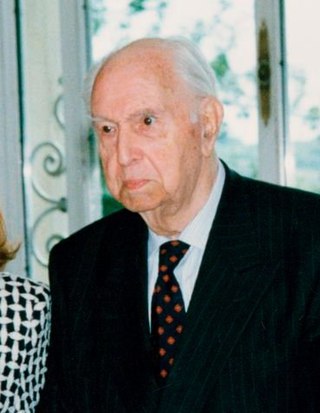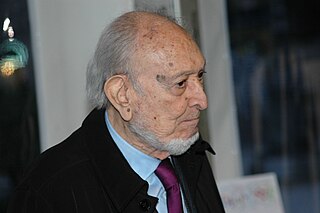
Marcelino Menéndez y Pelayo was a Spanish scholar, historian and literary critic. Even though his main interest was the history of ideas, and Hispanic philology in general, he also cultivated poetry, translation and philosophy. He was nominated for the Nobel Prize in Literature five times.

Martín Fernández de Navarrete y Ximénez de Tejada, was a Spanish noble, grandson of the Marquess of Ximenez de Tejada, knight of the Order of Malta, politician and historian. He was a Spanish senator and Director of the Spanish Royal Academy of History (1824-1844).

Visigothic script was a type of medieval script that originated in the Visigothic kingdom in Hispania. Its more limiting alternative designations littera toletana and littera mozarabica associate it with scriptoria specifically in Toledo and with Mozarabic culture more generally, respectively.

Francisco Ayala García-Duarte was a Spanish writer, the last representative of the Generation of '27.
Antonio Alatorre Vergara was a Mexican writer, philologist and translator, famous due to his influential academic essays about Spanish literature, and because of his book Los 1001 años de la lengua española.

Rafael Lapesa Melgar (1908–2001) was a Spanish philologist, a historian of language and of Spanish literature.

Pedro Laín Entralgo was a Spanish physician, historian, author and philosopher. He worked, fundamentally, on medical history and anthropology.
Miguel Ángel Garrido Gallardo is a Spanish philologist and semiotician. Born September 7, 1945, in Lubrín, Almería, Spain. He is the adopted son of the town of Los Santos de Maimona. He is a professor of research at the Consejo Superior de Investigaciones Cientificas (CSIC) [National Council for Scientific Research] in Madrid and distinguished university professor.

Germán Gullón, literary critic and writer, is a professor of Spanish literature and member of the Amsterdam School for Cultural Analysis at the University of Amsterdam. He has authored, beside his scholarly works and essays, two books of short stories, Adiós, Helena de Troya and Azulete, and two novels, Querida hija and La codicia de Guillermo de Orange.

Francisco Adolfo Marcos-Marín is a Spanish linguist, an emeritus professor of Linguistics and Translation at the University of Texas at San Antonio. Previously he was professore ordinario per chiara fama in the Università di Roma 'La Sapienza', catedrático de Lingüística General at the Universidad Autónoma de Madrid and catedrático de Historia del Español at the Universidad de Valladolid. He is a Corresponding Fellow of Academia Norteamericana de la Lengua Española and Academia Argentina de Letras, and an Honorary Citizen of San Antonio, Texas.
The Poem of Almería is a medieval Latin epic poem in 3851⁄2 leonine hexameters. It was appended to the end of the Chronica Adefonsi imperatoris, an account of the reign of Alfonso VII of León and Castile, and narrates the victorious military campaign of 1147 that culminated in the conquest of the port of Almería. The poem, as it survives, is unfinished, abruptly ending mid-line before recounting the actual siege of Almería itself. Of its surviving lines, 293 consist of "dénombrement épique, a stirring roll-call of the chief members and contingents of the army".
Ángel Martínez Casado is a Dominican friar and PhD in History and Theology.

Iris M. Zavala was a Puerto Rican author, scholar, and poet, who later lived in Barcelona, Spain. She had over 50 works to her name, plus hundreds of articles, dissertations, and conferences and many of her writings, including "Nocturna, mas no funesta", build on and express this belief.
José Manuel Blecua Teijeiro was a Spanish philologist, professor of Spanish Literature at the University of Barcelona and a member of the Royal Spanish Academy.

Josep Maria Castellet Díaz de Cossío, also known as José María Castellet, was a Spanish Catalan writer, poet, literacy critic, publisher and editor.

The Poema de Yuçuf or Poema de Yusuf is an anonymous poem written in Aragonese in the Aljamiado Arabic script from the fourteenth century. It was written in a strophic form called "cuaderna vía" by a Morisco poet. The text was discovered incomplete, but 380 verses have been preserved.
Jerónimo Cortés was a Spanish mathematician, astronomer, naturalist and Valencian compiler.

Guillermo Diaz-Plaja Contestí was a Spanish literary critic, historian, essayist, and poet.

Francisco Rodríguez Marín was a Spanish poet, paremiologist, and lexicologist.

Agustín González de Amezúa y Mayo was a Spanish academic, member of Real Academia Española, Real Academia de la Historia and Real Academia de Jurisprudencia y Legislación. He is best known as historian of literature who specialized in Siglo de Oro, especially in works of Cervantes and Lope de Vega. He held various important scientific posts during early Francoism, especially in Consejo Superior de Investigaciónes Científicas. Politically he supported the Traditionalist cause, first as an Integrist and then as a Carlist militant; in the early 1940s he was in national executive of Comunión Tradicionalista. In the mid-1920s he was member of the Madrid ayuntamiento.














